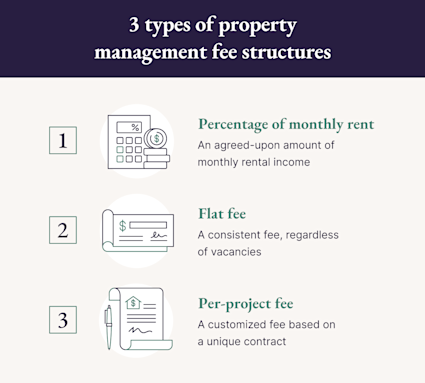How do monthly property management fees work?
You either pay property management fees when rent is collected or based on income. An important distinction to bear in mind is the difference between property management fees based on rent collected vs. rent due. Here are the main differences:- Rent collected: You only compensate the property management company when they successfully collect rent payments.
- Rent due: You pay a property management cost based on the proposed rental income — even if your rental becomes vacant.
Property management fee structure models

- Percentage of the monthly rent
- Flat monthly fee
- Guaranteed or hybrid model
| Pricing model | Typical range | Example cost (for $2,000 rent) | Notes |
|---|---|---|---|
| Percentage of monthly rent | 8%-12% | $160-$240 | Fees adjust when rent prices change |
| Flat monthly fee | $100-$200 | $100-$200 | Usually charged per unit |
| Guaranteed or hybrid model | 8%-15% | $160-$300 | The manager guarantees a minimum rent |
Percentage of monthly rent
In this arrangement, your property management company takes an agreed-upon percentage of the rent your vacation rental generates each month. The percentage is usually between 8% and 12% of rent collected. Many factors affect the percentage a company will charge. One advantage of this model is that the property manager is incentivized to keep your property booked for as many nights as possible. However, this means they may limit how many nights you are allowed to use the home since it is unavailable to rent during those times.| Pros | Cons |
| Property managers are incentivized to book guests | Limits the time you have access to the home |
| The property management fee is proportional to rent income | The more rental income you earn, the higher your fees are |
| Your fees automatically adjust with changes in rent | Fees can end up less predictable |
Flat monthly fee
Also known as a fixed-rate fee model, in this arrangement, you pay a flat fee each month, no matter how many nights your property is booked. If your home is located in a destination with predictable high and low seasons, a fixed fee may help stabilize your monthly management expenses. Using this model, you may go through periods when your property management fee only makes up a small portion of your monthly earnings. When your rental isn’t generating much income, however, it may feel like a significant expense. However, when your rental isn’t generating much income, it may feel like a significant expense. If you don’t intend to rent out your vacation home, a property manager could charge a flat fee to look after your property while you’re away. This is especially helpful for homeowners who live in another state or country and need to budget an average monthly property management cost for property management for vacation homes.The upside to a flat monthly fee arrangement is that it makes budgeting for your operating expenses more predictable. It’s important to note that some property management companies offering flat monthly fees have a wide range of surcharges for specific tasks, like responding to after-hours maintenance emergencies.| Pros | Cons |
| The property management fee is more predictable | Less flexibility when unforeseen issues arise |
| Pay the same fee despite high- and low-volume renter seasons | Subject to surcharges for additional work |
| Pay the same fee even for high-rent properties | Less incentive for the property manager to increase rental rates |
Guaranteed or hybrid income models
It’s also possible to customize the fee agreement between you and your property manager. One example is the guaranteed income arrangement. In this model, the management company guarantees the owner a consistent rental income each month, regardless of how many nights the home is rented out. The property management company will propose a rate based on how much income they think the short-term rental can generate, and keep any excess profits. So, if your property generates consistent year-round income, you might make more money with one of the other two models. If you do choose this model, make sure the wording of your contract is consistent with your goals.| Pros | Cons |
| Customize your property management contract | Homeowners unfamiliar with contracts have the potential to be overcharged |
| Benefits homeowners with multiple properties | May need to renegotiate prices often |
Hidden or additional property management fees
When learning how to manage a family vacation home and hiring a property management company, look for a company that is straightforward about its fee structure and any additional setup costs or fees. Here are some additional fees property managers may charge depending on the property type.- Account setup fee: When you first sign on with second home management services, they may charge a one-time $500 setup fee for things like installing a digital lock, taking listing photos and taking inventory of what’s included in the home.
- Can apply to: Short-term and long-term rentals
- Advertising fee: The cost of advertising your property on social media or within the property management team’s network is an additional service that could result in an advertising fee.
- Can apply to: Short-term and long-term rentals
- Maintenance fee: Most contracts cover basic vacation home maintenance services in their fees, but often limit what they include. You may have to pay extra for things like snow removal and landscaping.
- Can apply to: Short-term and long-term rentals
- Maintenance markup: Some property managers add 10 to 25% to vendor invoices to account for time spent coordinating and preserving their vendor relationships.
- Inspection fee: Managers may charge a separate, additional fee for property inspections.
- Lease renewal fee: Some property management companies may charge a small fee for every lease they renew. A fee may occur when extra negotiation is necessary to maintain the same tenant and keep the rental unit cash flowing.
- Can apply to: Long-term rentals
- Eviction fee: Evictions can result in court appearances and costly legal fees.
- Can apply to: Long-term rentals
- Early termination fee: This fee is only applicable when homeowners terminate their contract with a property management company earlier than expected.
- Can apply to: Short-term and long-term rentals
- Bill payment fee: Some property management companies may also charge a separate fee for the hours spent paying recurring bills like homeowners association (HOA) dues, utilities or even the property’s mortgage.
- Can apply to: Short-term and long-term rentals
- Late or unpaid service payment fee: When homeowners are late on their property management payments or don’t pay them at all, a property manager may charge an absence of payment fee.
- Can apply to: Short-term and long-term rentals
- New tenant placement fee: Whenever a property manager secures a new tenant or lease, you may have to pay an additional fee.
- Can apply to: Long-term rentals
- Reserve fund fee: A reserve fund is what some property managers use when unexpected fees arise or when they need to pay recurring bills on your behalf.
- Can apply to: Short-term and long-term rentals
- Returned check fee: A property manager may charge anytime you or a renter provides a bounced check or invalid form of payment that results in an additional round of payment processing.
- Can apply to: Short-term and long-term rentals
- Vacancy fee: Depending on your agreed-upon fee structure, some property managers may make less when your property is vacant. In that case, a vacancy fee gives the property manager the funds to continue maintaining the property.
- Can apply to: Short-term and long-term rentals
Factors that influence monthly fees
There are a lot of reasons why you might see variance in monthly fees from your property manager. Here are a few:- Property type: The type of home you have can affect the price a property manager charges. A detached single-family home may require more upkeep than a studio apartment, condo or similar multifamily unit.
- Property condition: Older homes are subject to more repairs and maintenance. If your property is older, you may incur higher property management fees than you would with a newer home.
- Property size: In general, the larger your property, the higher the property management fees. The more square footage you have, the more space the property manager will have to charge for vacation home cleaning services.
- Amenities: If your property includes special amenities that require additional or specialized maintenance, you may be charged extra. This can include pools, hot tubs, gardens, home gyms, and accessory dwelling units (ADUs).
- Location: Properties in high-traffic tourist areas or harsh weather environments may be subject to higher-than-average property management fees. Urban locations tend to have lower management fees than beach or mountain destinations because they’re easier to access and have less maintenance.
- Local market climate: Similar to how rent prices reflect current market conditions, property manager costs can also increase depending on the state of the rental market and local economy. With this in mind, choose a fee structure tailored to your property’s expected income potential. If prices often rise in your area, consider a flat fee arrangement.
Do Pacaso homes have a property manager?
Now that you’re familiar with property management costs per month, you’ll be looking for options. If learning how to manage a second home or vacation property doesn’t sound like the right fit for you, consider becoming a co-owner of a fully managed second home. Every Pacaso second home has a dedicated property management team so you can focus on your vacation — not maintenance. You’ll get the best of property management for second homes when you own a Pacaso home. Our experienced, local property managers handle the daily needs of each home and provide dedicated owner support.Is hiring a property manager worth the cost?
Hiring a trusted property management company for vacation homes or residential spaces can be worth the cost if you don’t have the bandwidth to communicate with tenants, manage paperwork or maintain your property. If you live nearby and can manage the property yourself, it may not warrant the costs.Frequently asked questions about how much property managers charge
01: Are property management fees tax-deductible?
Since property management fees can be a necessary part of generating vacation rental income, they can be tax-deductible in many cases. However, the amount deducted will largely depend on local tax laws and how you use your property.
02: What question should I ask a prospective property manager?
To find out exactly what a property manager charges, ask any questions that help clarify your agreement. Here are some to get you started.
- What is your fee structure?
- What services are and aren’t included? (ex. property management answering service)
- Are there any setup or onboarding fees?
- Do you mark up maintenance and repair costs?
- Is there a contract, or can I cancel at any time?
- Can I tour some properties currently under your management?
- How many staff are available?
- How do you handle maintenance emergencies and renter requests?
- Where do you advertise your rental listings?
03: Where can I find a property manager near me?
You can find the best property management near you by searching online, contacting the real estate agent who sold your property or asking your HOA for referrals.
04: How can I negotiate property management fees with a prospective manager?
You can negotiate fees with a prospective property manager by reviewing a draft agreement and making a counteroffer or requesting an amendment to one or more price points. Be prepared to share the logic behind your suggestions.
05: Are there DIY property management options to save money?
Yes, you can DIY property management. However, instead of paying with cash, you will pay in the amount of time you spend managing and maintaining your property. If you want to free up your time, find the best vacation property management company for you.










